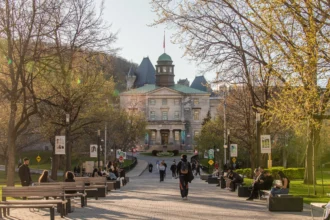A couple weeks ago, I sat in a group and discussed how to rebalance, reform, and redefine society. Although we talked about the need for a “radical renewal” of the short-sighted and materialistic actions of individuals, firms, as well as governments, we did not hold hands, braid each other’s hair, nor reminisce about Woodstock.
Forty professionals from diverse industries arrived promptly and formally to McGill’s Faculty Club to discuss Professor Henry Mintzberg’s recent publication, “Rebalancing Society: Radical Renewal beyond Left, Right, and Centre.” Think John Lennon’s “Imagine” meets the faculty of Management. Paradigm shift? Absolutely. Given global Occupy movements, the internet, and serious environmental concerns, today’s leading innovators focus on sustainability; they question our current way of life and offer solutions for living in a more socially, emotionally, and environmentally sustainable way.
A “radical renewal,” according to Professor Mintzberg , turns corrosive individualism into conscientious individuality to build a community of members with a purpose. It shifts the focus from human resources to human resourcefulness. The commoditisation of the individual belies the belief that we derive our value from our material contributions to society. This notion drives our hand-to-mouth capitalist system which incentivizes short-term gains at the expense of long-term progress. Professor Mintzberg urges people to acknowledge that all human actions have externalities that we—not governments, banks, or businesses—are responsible for. In the words of Aboriginal elder Chief Seattle: “We do not inherit the earth from our ancestors; we borrow it from our children.” To achieve this vision, Professor Mintzberg divides society into three pillars: public, private, and plural. The public sector consists of respectable governments, the private consists of socially responsible firms, and the plural consists of non-profit, community-based initiatives. In a “rebalanced 2030”, the individuals within these three sectors think and act holistically towards themselves, their communities, and their environments.
After introductions and a light supper, the workshop facilitator instructed us to envision what our “rebalanced’” society would look like and then illustrate it in words, symbols, and pictures. Using Crayola greens, browns, purples, and blues we got to work creating our own future utopias. We grouped off into mini think tanks to share our masterpieces My think tank consisted of Bcom student Gregory Frank, Susan Mintzberg (a PhD candidate in McGill’s Social Work program), Professor Anita Nowak and Sauvé Scholar Carlos Rueda (two brains working with Professor Mintzberg on McGill’s group MOOC or GROOC to create an interactive online community of scholars and students). Each person brought their own experience and expertise to the exercise : Professor Nowak used intersecting green circles to depict empathy, Rueda illustrated Demosthenes’ beginnings of democracy, Frank focused on a “suburbless” community, Mintzberg drew a green field of social equality, and I focused on one-to-one relationships.
We were then asked to condense our five different visions into one fundamental idea. Despite our diverse themes, we all agreed that a rebalanced society would focus more on individual well-being. Rueda came up with the aphorism “a balanced society cannot exist with an individual who is imbalanced.” Nowak added to this concept the importance of building holistic relationships that re-orient us to interact more mindfully towards others. The workshop facilitator then asked a representative from each table (or mini think tank) to share the pith of their discussions. These contributions varied from advocating for micro changes on an individual level to macro overhauls such as better relationships between the arts and business, free-trade economies, and environmental reforms. The common strand stipulated that a “radical renewal beyond left, right, and centre” is about rebalancing our society to respect good values rather than good value.
As the workshop ended, the energy in the room reminded me of the Tom Pain quote that closes Mintzberg’s pamphlet. The year was 1776 and Paine, a figurehead for American Independence, said “we have it in our power to begin the world over again.”After Professor Mintzberg’s final remarks, participants lingered in the dining room to continue the discussion which dispersed into hopeful and excited voices that descended down the steps of the Faculty Club and mingled with the downtown din, leaving the impression that maybe, just maybe we can too.
The pamphlet “Rebalancing 2030: a radical renewal beyond left, right, and centre” can be downloaded for free on Professor Mintzberg’s website

